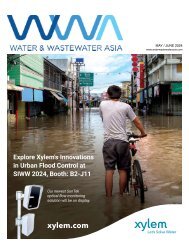Water & Wastewater Asia May/Jun 2021
Water & Wastewater Asia is an expert source of industry information, cementing its position as an indispensable tool for trade professionals in the water and wastewater industry. As the most reliable publication in the region, industry experts turn this premium journal for credible journalism and exclusive insight provided by fellow industry professionals. Water & Wastewater Asia incorporates the official newsletter of the Singapore Water Association (SWA).
Water & Wastewater Asia is an expert source of industry information, cementing its position as an indispensable tool for trade professionals in the water and wastewater industry. As the most reliable publication in the region, industry experts turn this premium journal for credible journalism and exclusive insight provided by fellow industry professionals. Water & Wastewater Asia incorporates the official newsletter of the Singapore Water Association (SWA).
You also want an ePaper? Increase the reach of your titles
YUMPU automatically turns print PDFs into web optimized ePapers that Google loves.
VIEWPOINT<br />
Electrical Incidents<br />
can occur in an<br />
instant, with no<br />
warning as those<br />
given by incoming<br />
typhoons and other<br />
storm events<br />
There are specific roles in managing ICS, falling into five main categories:<br />
1. COMMAND: One person should take charge of any incident,<br />
and allow no contradictory instructions to confuse operators and<br />
responders<br />
2. OPERATIONS: This group is responsible for directing and ensuring<br />
the tactical actions to meet and mitigate the situation<br />
3. PLANNING: This group collects incident information as it<br />
comes in, documents it and then ensures it goes to the right<br />
response teams<br />
4. LOGISTICS: Confusion can reign at any incident, but everything<br />
needs to be coordinated from where emergency response teams<br />
go, to where the teams can go for supplies, meals if needed,<br />
and so on<br />
5. FINANCE/ADMINISTRATION: This group needs to track all<br />
financial expenditures, including costs of responders, equipment<br />
needed, and contracts needed to be signed to get the right<br />
people involved<br />
Incidents can even be created by<br />
mechanical failures or electrical power<br />
sources, ones that are thought to be<br />
completely reliable and outside the<br />
facility’s control. When one power<br />
generator trips and goes offline, power<br />
surges can trip others in a cascading<br />
and growing circle around the original<br />
problem source unless other powergenerating<br />
facilities are extremely<br />
vigilant.<br />
Electricity cannot be shut down as<br />
easily as turning off a water tap, and<br />
unless a facility has alternate standby<br />
power generators, an electrical incident<br />
can quickly get out of control if impacts<br />
critical cooling and chemical systems<br />
of nearby facilities. Operators may have<br />
no idea that a potential life-threatening<br />
situation is about to impact them.<br />
Steam pipeline incident: One piece of 61cm diameter pipe, Schedule 160, that was 30.5m long, went 800m into the<br />
field. The pipe weighed 807 kilogrammes per linear meter with a wall thickness of 6cm. Twenty-five metric tonnes<br />
hurtling 0.8km through the air is a life-threatening incident<br />
Every facility – no matter how big or<br />
small – needs an ICS, or at least a<br />
modified version of one. Consider the<br />
following questions:<br />
- WHAT do you need to do when an<br />
incident occurs where you are or<br />
nearby?<br />
- WHO is responsible for doing it?<br />
- HOW do you communicate with<br />
others, especially if radio and cell<br />
phone coverage may be nonexistent?<br />
- WHAT is the procedure if someone<br />
in the ICS is injured? Do medical<br />
teams have easy access to the<br />
location?<br />
46


















